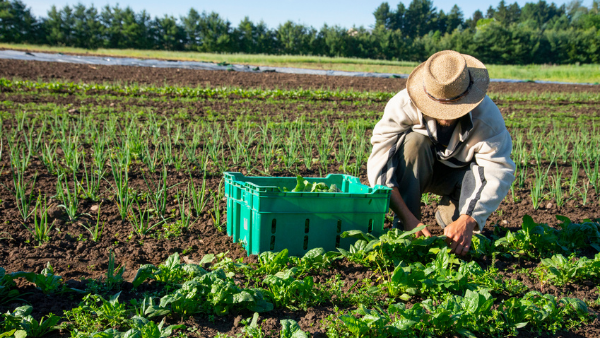Author
With an estimated 500,000 job vacancies across the food and drink sector, the National Farmers’ Union (NFU) is addressing seasonal labour shortages across the United Kingdom as a key item on its agenda. Tom Bradshaw, vice-president of the NFU claims that farms are “struggling to recruit the workforce they need” whilst farmers have reported offering wages that are double those offered in previous years in order to attract domestic workers.
With Agriculture at the heart of a thriving UK economy, the Government is under pressure to address this situation by increasing the number of seasonal workers, who can come to work in the UK. Against the backdrop of Brexit, Ministers are reluctant to open the immigration floodgates again, arguing that better pay and working conditions will encourage more UK workers to fill the vacancies.
Who would usually form the labour force for seasonal farm work?
The NFU reported that in 2020 only 11% of seasonal workers were UK resident. Historically, the seasonal labour force has consisted mainly of EU workers such as Romanians and Bulgarians. Reports suggest that EU workers are now choosing to work in countries such as France and that return workers are reluctant to work in the UK this year.
Original government measures to address the labour shortage
The Government extended its seasonal workers’ pilot scheme allowing overseas workers to take up seasonal work for a period of up to six months in the UK.
Other measures included the ‘Pick for Britain’ campaign encouraging UK based workers to take on seasonal harvest work. Whilst the scheme saw a large initial uptake, one of its biggest recruiters estimated that only around 1% of British applicants stayed past the initial 6 weeks.
As highlighted in the national media the UK is now facing critical shortages of workers across various different sectors. Many organisations, including the National Farmers’ Union, have been calling for changes to the UK immigration rules (Rules) to allow more EU workers back into the UK to fill these posts.
Until recently, the Rules enabled overseas workers to obtain permits for seasonal farm work in the UK for a period of up to six months. However, the only workers permitted were those with roles in the edible horticulture sector, growing certain vegetables, soft fruit, top fruit, vines & bines or mushrooms. These were however very restrictive categories and there have been calls recently to widen these roles to cover other important ones within the food production sector, including haulage drivers.
New extension to immigration rules
A statement of changes to the Rules was released by the Home Office and UK Visas and Immigration on 11 October 2021. Effective from 4pm on 11 October, the Statement amends the “Appendix Temporary Work – Seasonal Worker” to add poultry production work and haulage driving work in the transportation of food goods to the seasonal worker definition. Poultry production roles include butcher, plucker, food operative and meat packer. Haulage roles cover large goods vehicle drivers, transporting food goods.
Employers can request workers from any of the four Government-approved recruitment agencies. The changes dictate that applications should be made by 15 November for roles in the poultry production sector and by 1 December for haulage roles.
What effects will flow from the changes?
The changes extend the scope of the Rules and it is hoped that they will facilitate an increase in the flow of seasonal workers into the UK; this is particularly key in the busy run up to Christmas – a period that demands availability of food products. However, the longevity of the extensions is limited, with poultry workers only granted permission until 31 December 2021 and haulage workers granted permission until 28 February 2022. Employers in the food sector can only speculate what changes will be implemented past these dates and should keep up to date with any further guidance and extensions released by the Home Office.
For the longer term, there is a need for more permanent seasonal immigration schemes, as well as for improvements to be made to encourage UK workers to choose to work within the agriculture industry.
The farming and wider agricultural community may also look towards reducing the need for an entirely human labour force. The Department for Environment, Food and Rural Affairs has launched a review into automation in horticulture and, moving forward, the need and desire for lower cost human labour may be replaced with a focus on technology. With understanding of artificial intelligence improving exponentially, the cost of utilising it within farming practices is likely to reduce over the coming years.
Contracts for new workers
In the short term, for any rural businesses taking on seasonal or other farm workers, we cannot emphasise enough how important it is to issue contracts of employment to all employees. It is now a legal requirement to do so immediately. We can provide assistance to meet the requirements of all relevant employment legislation and to ensure the business is protected from day one.

